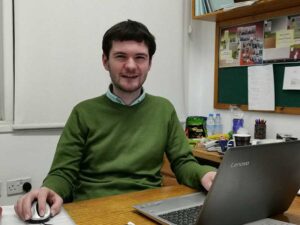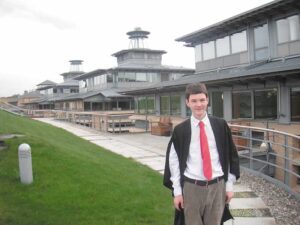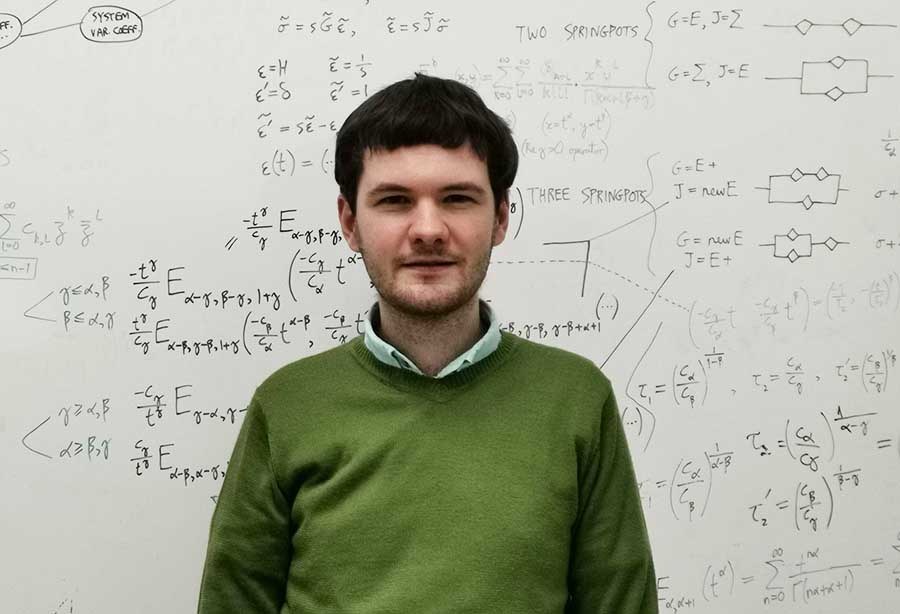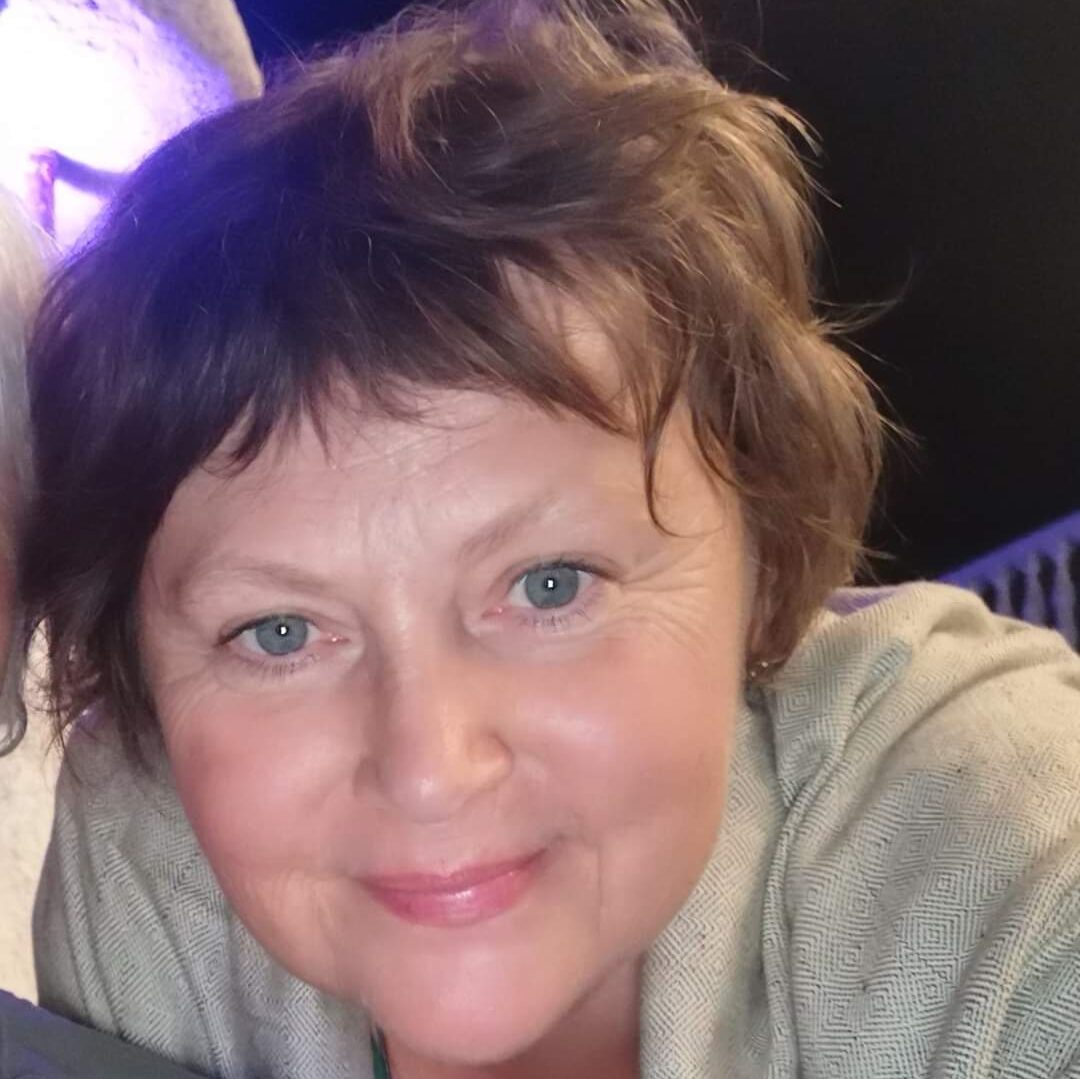The youngest person to ever get a GCSE in maths now teaches at a university in the north although being the youngest person in the room has never bothered him. With conclusions that cannot be challenged, maths can be understood at any age, he tells AGNIESZKA RAKOCZY
The first time time media took an interest in Arran Fernandez he was five years old. That was in 2001 and he had just sat his GCSE in maths, becoming the youngest person ever to take the exam.
At the age of 15, he won a place at Cambridge, the youngest student in more than 200 years to do so. The mark of prodiguous excellence had been set by his illustrious and aptly named predecessor, the 14-year-old William Pitt the Younger, who studied there in 1773.
After gaining his PhD in maths at Cambridge in 2018, Fernandez now works as an assistant professor at Famagusta’s East Mediterranean University in north Cyprus.

In his office at Emu
We met in his campus office. Aran is tall, much taller than I expected. Mentally, I chided myself. Why wouldn’t he be? He’s a full grown man now. His warm smile and the cheerful bright colours he favours wearing were a welcome contrast to the dark January afternoon outside. The office is dominated by a large white board that is covered with thousands of small black signs. Equations, I surmise, thinking of Russell Crowe playing mathematician John Nash in A Beautiful Mind. QED too, since that just about sums up all I really know about mathematics.
We start chatting about Arran’s childhood and what prompted him to take his maths GCSE so young. When did his parents realise he was so talented?
“Well, I don’t believe in natural talent”, the 25-year-old assistant professor confesses. “Everything has to be nurtered. Everything I achieved is because of my education and the opportunities I had. And the big part of my story is that I never went to school. My parents never believed in the official education system. They thought that this is exactly what makes learning boring. Because school-based education has to cater to the average or maybe even to the lower end of a big group of students so everyone can learn. When you are just one person at home, you can learn in a much more personal way.”
So thanks to his parents’ home-schooling philosophy Arran, their only son, was educated by his father and mother. His learning started so early he can’t even remember it. What he knows is that while he was taught a lot of things (including Russian since his father was fluent) maths was always the main focus.
“Perhaps becasue it is something you can learn in a natural way and you don’t need to have any context or social knowledge to understand it,” he speculates. “Because when you learn about history you need to have some kind of maturity to understand its social aspects. And in the case of science, physics or biology, you need to observe things and do experiments. But maths is something that you can understand at a very young age and your understanding can just increase and become deeper and broader as you continue. Maybe that is why most child prodigies excel in maths. And maybe that is why my parents focussed so much of my education on maths because it is something one can understand at any age.”
Taking your child’s entire education on is quite something, I remark. One has to be very confident.
“Yes, I suppose they believed in themselves to be able to do so,” Arran agrees.
“Especially my father. He was doing most of it and he is a savoury, strong character. He has strong beliefs about the world and in himself, and he was helping me a lot, even when I was at university as an undergraduate.”
An only child, Arran was born in 1995 in Glasgow, where his parents were studying at the time. His father has Spanish lineage, having a great grandfather who was a sailor who moved from Spain to St Vincent in the Carribean. A son later left the islands for the UK where he married an English woman. Arran’s mother is Norwegian.
“My father was writing and my mother is an economist. They both worked from home which also made things easier,” Arran says.
“My childhod was pretty secluded, pretty much confined to my family and not that much with other kids but this was more to do with my family in particular rather than the whole concept of home education. And yes, I did miss other kids a bit but I managed to recover from it.”
He recalls his days as being happily engrossed in a mix of assorted studies featuring basic programming and biology, reading lots and playing mathematical games.
“I was studying many things without getting any formal qualifications. Some days, we were in a room where I had my desk and studying all day long intensely. My father would write on a blackboard, we were going through books. Other days, we would be much more relaxed. Maybe that is another advantage over the school system. You go to school and you have to take the same class as everyone else and then you must take exams. When you are educated at home, everything is much more flexible. For example, I used to read a lot of books on animals and animal behaviour and I used to be a keen bird watcher but I have never studied biology in a more scientific way.”
When I ask Arran about where the family lived, he laughs cheekily.
“This is something I never used to tell journalists because we were receiving all this media attention and we didn’t want people with cameras coming to our house. So we lived in Kent but we used to tell people we lived in Surrey, and then we moved to Surrey… and then for eight years I was living mostly in Cambridge.”
When 15-year-old Arran was accepted into Fitzwilliam College in Cambidge to study maths his father had to come along as well. “It was one of the conditions of being accepted. Because of my age somebody had to be responsible for me. During the first year, before I turned 16, my father even had to accompany me to lectures. That was a bit strange. The whole room full of students aged 18-19 and this one man over 50…”

At Cambridge in 2010
Arran says he didn’t have too much difficulty adapting to university life “I suppose everyone who starts university has to adapt to a new environment so I wasn’t an exception”. He insists that having been the youngest person in the room for most of his life has never really bothered him or struck him as strange.
“One day I am sure I will be the oldest in the room but it hasn’t happened to me yet. Even here, in north Cyprus, some of my students are older than me,” he remarks with a philosophical shrug.
Even though it might seem a strange place for such a mind to end up, Arran says he applied for a job at the EMU at the suggestion of a well-known authority in his field with whom he had been working in Turkey. “The field I specialise in is much more popular in this part of the world than in the West, and this professor was like the second, unofficial, supervisor of my thesis. I collaborated with him a lot,” he explains.
“A couple of other places gave me offers as well but in the end I came here because it felt it was the best option. I haven’t regretted it. It is a good place to be, good for somebody at the beginning of their career. I can be here in peace and do my research. And it satisfies my heart to be in a place where I can make a difference. Most of my peers from Cambridge work in the UK or in the States and yes, they are doing what is the best for them. However, if everyone is doing this nobody is going to help out in these parts of the world that are left behind. Here, we have so many students from Africa and some of them are really bright and deserve the same opportunities. It is good for them to have a teacher from Cambridge.”
At Cambridge, Arran was to break another record when in June 2013 he became the youngest Senior Wrangler ever, aged just 18. At Cambridge this means the person who achieves the highest overall mark among the Wranglers (students who gain first-class degrees in mathematics), and the accolade is often seen as equivalent to “the greatest intellectual achievement attainable in Britain”. Indeed, years spent in Cambridge are often recalled by remembering just who the Senior Wrangler had been in a given year.
In 2018, he completed his PhD on (I had to take a photo to make sure I got it right) ‘Analysis in fractional calculus and asymptotics related to zeta functions’. Baffled yet impressed, I asked, what is this about? Arran graciously puts me at my ease by laughingly informing me that every mathematician faces a major challenge when trying to explain what they do.
He starts talking about car speeds, distances, acceleration, basic and fractional calculus, how maths can define things that even physics or geometry cannot. Then we move to viscoelasticity, the study of “things which are between liquid and solid.” I remain baffled, and impressed.
“My favourite example of how to describe the usefulnes of it is that if you have a label on a jar and want to pull it off, if you do it slowly it will come off nicely but if you do it fast, the label tears in half. The reason for this is that at slow speed the glue behaves like a liquid but at high speed it is solid. And this can be defined using equations, fractional calculus, and it can be applied in biology or to calculate the speed of removing something or injecting…
“Frankly, I don’t know too much about applications,” he admits engagingly.
“I am a pure mathematicain just doing the maths but I know enough to justify to people why what we are doing is needed.”
When I ask which comes first – the maths or the application – Arran explains that it can go both ways. More often than not, he says, it is “people creating some maths and maybe decades later some engineers, physicists or biologists realising they can use it”. This, he adds, justifies “doing a lot of maths even if you don’t see any application for it.”
He relates a story about the famous mathematician Godfrey Harold Hardy who lived a 100 years ago and took pride in the fact that he never did anything “useful”.
Hardy was working on number theory, a theory “now really important in the world because it is used in cryptoanalysis, ciphers and banking security”. So, as Arran looks at it, the Hardy who proclaimed his non-usefulness, would probably be “very angry” to see the uses to which his theory has been put.
He allows that there are situations when engineers, for example, in need of a specific equation to solve a problem they face present an equation to a mathematician like himself. “I can look at it and even if I have no idea about the details of their work I can analyse and maybe solve the problem, and give it back to them and maybe they can interpret it for use in their application.
“This did happen to me a couple of times and it is really a beautiful experience to see that there is something that they are looking at in the real world which we are looking at in maths and the same thing is coming out and agrees. This is when you know that you are doing something right.”
So does it mean he is happy with his choice of work even though at age five he also aspired to be a lorry driver or an astronaut? “Absolutely yes. Maths is a very certain subject. That is why I chose it to start with – because it gave me this kind of certainity.When you prove something in maths you know it for sure and there is no appeal. When you study political science or sociology maybe you have to adapt to this point of view or that. The same with literature. Your conclusions can be measured only subjectively. Even in science, you have some results that come from experiments and you think the world looks a certain way but then somebody else does another experiment and the world changes. While in maths once you prove something it is there, it is objective. We don’t know whether it is useful or not but we know it is true.”







Click here to change your cookie preferences